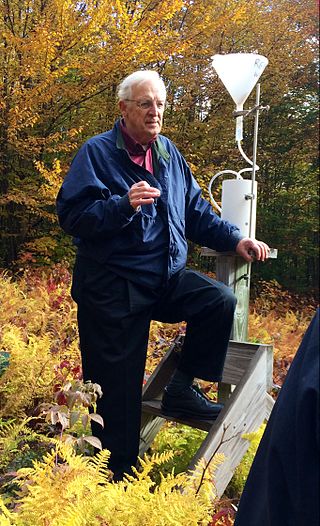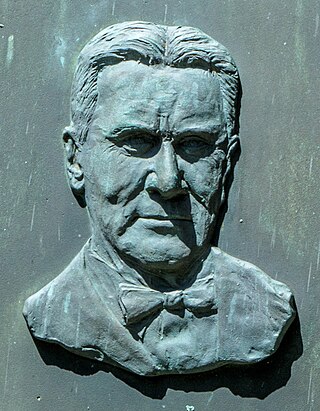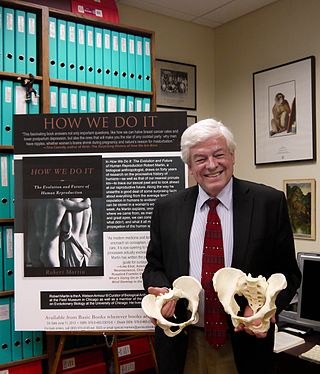John J. Gilbert (July 18, 1937) is an American biologist. He taught at Princeton University and Dartmouth College, and received the 2003 A.C. Redfield Lifetime Achievement Award. He is currently professor emeritus of biology at Darmouth.
John J. Gilbert (July 18, 1937) is an American biologist. He taught at Princeton University and Dartmouth College, and received the 2003 A.C. Redfield Lifetime Achievement Award. He is currently professor emeritus of biology at Darmouth.
Gilbert received a B.A. (with Honors) in Biology, from Williams College (1959), a Ph.D. in Biology from Williams College (1963) and an NIH Postdoctoral Fellow from the Department of Zoology at the University of Washington (1963–64).
In 2003 Gilbert received the lifetime award "For developing and sustaining the field of rotifer ecology and biology; for successful mentorship for more than a quarter century; and for vital service contributions to the national and international communities of limnologists and oceanographers."
Between 1973 and 1978 he was the recipient of the NIH Career Development Award.
Gilbert has held the following teaching roles in Biology: he was the assistant professor in the Department of Biology at Princeton University between 1964 and 1966, at the Department of Biological Sciences at Dartmouth College between 1966 and 1969 (where for the following five years he held the role following his retirement, he retired he earned the status of professor emeritus).
In 1997 Gilbert received the William Evans Visiting Fellowship from the Department of Zoology at the University of Otago, New Zealand. [1]
Gilbert has been a member of the following scientific associations: the American Society of Zoologists (between 1964 and 1988), the American Association for the Advancement of Science (which he joined in 1963 and was also a Fellow), the Ecological Society of America and the American Society of Limnology and Oceanography, the International Association of Theoretical and Applied Limnology (all of which he joined in 1964).

Harold Tafler Shapiro is an economist and university administrator. He is currently a professor of economics and public affairs at the Princeton School of Public and International Affairs at Princeton University. Shapiro served as the president of University of Michigan from 1980 to 1988 and as the president of Princeton University from 1988 to 2001.

Ramon Margalef i López was a Spanish biologist and ecologist. He was Emeritus Professor of Ecology at the Faculty of Biology of the University of Barcelona. Margalef, one of the most prominent scientists that Spain has produced, worked at the Institute of Applied Biology (1946–1951), and at the Fisheries Research Institute, which he directed during 1966–1967. He created the Department of Ecology of the University of Barcelona, from where he trained a huge number of ecologists, limnologists and oceanographers. In 1967 he became Spain's first professor of ecology.

Gene Elden Likens is an American limnologist and ecologist. He co-founded the Hubbard Brook Ecosystem Study at the Hubbard Brook Experimental Forest in 1963, and founded the Cary Institute of Ecosystem Studies in Millbrook, New York in 1983.
Stephen P. Hubbell is an American ecologist on the faculty of the University of California, Los Angeles. He is author of the unified neutral theory of biodiversity and biogeography (UNTB), which seeks to explain the diversity and relative abundance of species in ecological communities not by niche differences but by stochastic processes among ecologically equivalent species. Hubbell is also a senior staff scientist at the Smithsonian Tropical Research Institute in Balboa, Panama. He is also well known for tropical forest studies. In 1980, he and Robin B. Foster of the Field Museum in Chicago, launched the first of the 50 hectare forest dynamics studies on Barro Colorado Island in Panama. This plot became the flagship of a global network of large permanent forest dynamics plots, all following identical measurement protocols. This global network now has more than 70 plots in 28 countries, and these plots contain more than 12000 tree species and 7 million individual trees that are tagged, mapped, and monitored long-term for growth, survival and recruitment. The Center for Tropical Forest Science coordinates research across global network of plots through the Smithsonian Tropical Research Institute. The program has expanded into the temperate zone, and is now known as the Forest Global Earth Observatory Network or ForestGEO.

Alfred Clarence Redfield was an American oceanographer known for having discovered the Redfield ratio, which describes the ratio between nutrients in plankton and ocean water. He was a professor of physiology at Harvard University and one of the original staff of the Woods Hole Oceanographic Institution upon its founding in 1930.
Thomas Eugene Shenk is an American virologist. He is currently Emeritus Professor of Life Sciences in the Department of Molecular Biology at Princeton University.
David M. Gilbert is an American molecular biologist, known for work in DNA replication. He is an investigator at the San Diego Biomedical Research Institute. Gilbert was formerly a professor of molecular biology in the Department of Biological Science and was co-founder and a director of the Center for Genomics and Personalized Medicine at Florida State University.
Barry John Everitt, is a British neuroscientist and academic. He was Master of Downing College, Cambridge (2003–2013), and Professor of Behavioural Neuroscience at the University of Cambridge (1997–2013). He is now emeritus professor and Director of Research. From 2013 to 2022, he was provost of the Gates Cambridge Trust at Cambridge University.
Dale Lester Boger is an American medicinal and organic chemist and former chair of the Department of Chemistry at The Scripps Research Institute in La Jolla, CA.
Robert Harry Socolow is an American theoretical physicist and professor emeritus of Mechanical and Aerospace Engineering at Princeton University.

Robert D. Martin is a British-born biological anthropologist who is currently an Emeritus Curator at The Field Museum of Natural History in Chicago, Illinois. He is also an adjunct professor at University of Chicago, Northwestern University, and University of Illinois Chicago. His research spans the fields of anthropology, evolutionary biology and human reproductive biology. Additionally, he writes a blog on human reproduction for Psychology Today.

Thomas Dyer Seeley is the Horace White Professor in Biology in the Department of Neurobiology and Behavior at Cornell University. He is the author of several books on honeybee behavior, including Honeybee Democracy (2010) and The Wisdom of the Hive (1995) He was the recipient of the Humboldt Prize in Biology in 2001. He primarily studies swarm intelligence by investigating how bees collectively make decisions.
Clifford Hiley Mortimer was a 20th-century British zoologist and expert in hydrodynamics. He was the recipient of the 1995 A.C. Redfield Lifetime Achievement Award.
Jack Vallentyne was a Canadian biochemist and the 2001 recipient of the A.C. Redfield Lifetime Achievement Award.
Robert D. Goldman is an American cell and molecular biologist. He was the Chair of the Department of Cell and Molecular Biology at Northwestern University Feinberg School of Medicine. He held the Stephen Walter Ranson Professor of Cell Biology at the institution. He is currently a Professor of Cell and Developmental Biology at Feinberg.

John Maxwell "Jake" Jacobus Jr. was Leon E. Williams Professor of Art History, emeritus, at Dartmouth College, New Hampshire, USA. He was a specialist in modern art and architecture and particularly the art of Henri Matisse.

Dame Carolyn Waugh Burns is a New Zealand ecologist specialising in lakes. She is an emeritus professor at the University of Otago.
Lynn Moorhead Riddiford is an American entomologist and developmental biologist. She was the first female faculty member in the Harvard Biology Department where she served as an assistant and associate professor. She is an emeritus professor at the University of Washington. In 1997, she was the first awardee of the Recognition Award in Insect Physiology, Biochemistry, and Toxicology from the Entomological Society of America. Riddiford studies the endocrinology of insects, specifically the tobacco hornworm.
Charles Remington Goldman is an American limnologist and ecologist.
Kathryn Linn Cottingham is a Professor of Ecology, Evolution, Environment and Society in the John Sloan Dickey Center for International Understanding at Dartmouth College. She is a Fellow of the Ecological Society of America and American Association for the Advancement of Science. From 2020 she will serve as editor-in-chief of the journal Ecology.